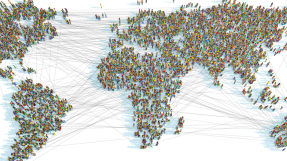
Thousands more Iraqis have fled their homes in recent days, as Islamic State forces continue their advance, perpetrating terror on once peaceful communities as they go.
Christian Aid, working on the ground across all faith communities with the humanitarian organisation REACH, reports tens of thousands of aid distributions to displaced Iraqis in Sinjar, Dohuk, Kirkuk, Karbala and Sulaymaniyah, handing out food baskets, children's clothes and hygiene items.
Many are severely traumatised, having lost family members to desperate horrors such as kidnap, rape, crucifixion and beheadings.
Ann Ward, Christian Aid's consultant in Iraq, has been working with local partners on the ground distributing aid to displaced Yazidis, Shia Shabak, Shia Turkmen and Christians.
"The numbers of people are overwhelming the government here as well as the aid agencies and local Kurdish agencies," she told Christian Today. "The people need everything from clothes and shoes to basics such as food and babies' diapers."
She described elderly men in their 80s with no bed to sleep on, no blankets and no basic shelter. "They have no food. They left in such an abysmal hurry, they had no plans of where to go."
One story in particular she says she cannot get over. A man arrived at a REACH food distribution centre on behalf of four families.
"He said, 'Please help.' They were left sitting in a field under some trees. They had nothing, no beds, food or clothes."
She immediately gathered some supplies and went to find the families.
"Sure enough there was the family, sitting on piles of earth by the edge of the highway under some trees near a rubbish-filled field in the heat. It was about 45 degrees. They looked in such shock, a combination of grief, sorrow."
There were 12 children and 26 adults. They were eventually able to find one room to rent for all of them, at a house nearby, and neighbours have been helping with food and other provisions. They take it in turns to sleep, some during the day, because there is not room for all to lie down together. There are many such cases.
Ward said it was "very moving" to see people of all local faiths in the host towns and villages, helping the refugees with enormous generosity, people who themselves had very little indeed, especially by western standards.
She also tells the story of another young man who lost his young brother as they fled their home, and then his mother was taken by IS militia.
"I met a young Yazidi man named Yassir today at the REACH food distribution. He asked me if I could help him. He had lost his 12-year-old brother in their flight from Sinjar. He did not know what to do or who to turn to as his brother's phone was off. We referred him to ICRC in the hopes that they can trace him. What is worse, their mother was taken by IS militia. She is being imprisoned in a village near Mosul and has been able to call her son by phone every few days, in secret. He is desperate to find a way to help her and to locate his brother."
She sees no immediate prospect of relief. Even if IS is driven back and out, which itself seems unlikely in the short term, there is too much devastation in the once-thriving wheat fields, agricultural lands and mountain villages of northern Iraq to make any quick recovery possible. The villages these refugees came from have been decimated.
"There are great psychological effects of displacement. Long-term it looks terrible. IS is so well mobilised, so entrenched. We don't anticipate them going anywhere quickly. IS have planted bombs. Before anyone goes home, their villages will have to be cleared of unexploded ordinances."
She feels safe in Sulaymaniyah where she is based. "But all of us are worried about these sleeper cells coming to life. People have said they have seen evidence of it here. I am keeping a low profile and feel protected, but it is unpredictable. These IS groups are well organised."
The work of Christian Aid in the Iraqi crisis has been made possible thanks to the Iraq Crisis Appeal.
Christian Aid stands against all forms of discrimination and believes all groups must be accorded their full rights, including freedom of religion. The charity responds on the basis of need, and works with and for people of all faiths and none. Christian Aid's partner in Iraq is REACH, which has stepped up its work to help this new wave of displaced.
Support Christian Aid's Iraq crisis appeal here













